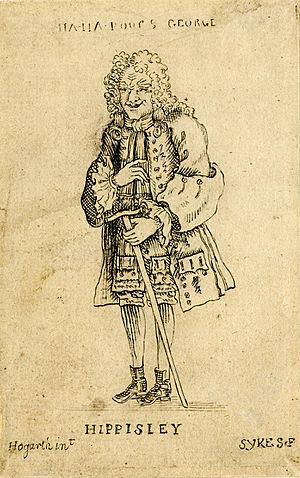John Hippisley (actor) facts for kids
John Hippisley (born January 14, 1696 – died February 12, 1748) was a famous English actor and writer of plays. He was known for his funny roles. John performed in big theatres in London, like Lincoln's Inn Fields and Covent Garden. He was the very first actor to play the character Peachum in the popular play The Beggar's Opera. He also built his own theatre in Bristol, called the Jacobs Well Theatre, where he and his daughter Elizabeth performed.
Contents
Early Life and Acting Career
John Hippisley was born near a place called Wookey Hole in Somerset, England.
His first known acting job was in November 1722. He performed at the Lincoln's Inn Fields theatre in London. His first role was Fondlewife in a play called The Old Bachelor by William Congreve. People said he had never been on that stage before.
After that, he played many other funny characters. These included Sir Hugh Evans in Shakespeare's The Merry Wives of Windsor and Polonius in Hamlet. He stayed at Lincoln's Inn Fields until 1733. During this time, he played many different parts. One of his most important roles was Peachum in John Gay's famous play The Beggar's Opera. He first played Peachum in January 1728.
As a Playwright and Theatre Owner
John Hippisley was not just an actor; he also wrote plays. In August 1728, he performed his own play, The English Thief, or The Welsh Lawyer, in Bristol. Later that year, he rented some land in Bristol. He then built a small theatre there called the Jacobs Well Theatre. It opened on June 23, 1729, with a play called Love for Love.
The theatre was quite small. Actors sometimes had to walk around the outside of the building to get to the other side of the stage! John brought his acting company to this theatre every summer from 1741 to 1747. His daughter, Elizabeth, also acted there. John had plans to build an even bigger theatre in Bath in 1747, but he passed away before he could do it.
In 1731, back at Lincoln's Inn Fields, John performed his play The Journey to Bristol, or the Honest Welshman. This play was probably first shown in Bristol. He also performed in his own play called Flora around 1730.
Performing at Covent Garden
In 1732 and 1733, the Lincoln's Inn Fields theatre and the Covent Garden theatre were managed by the same people. In December 1732, the new Covent Garden Theatre opened. John Hippisley performed there on the very first night. He played Sir Wilful Witwoud in Congreve's The Way of the World.
John stayed at Covent Garden for the rest of his life. He took on many new roles there. These included Shallow in Henry IV, Part 2 and Clown in The Winter's Tale. In January 1747, he was the first actor to play Sir Simon Loveit in David Garrick's play Miss in Her Teens. After this, his name stopped appearing in the theatre programs.
His Acting Style
People who watched John Hippisley act said he was a very funny comedian. He had a lively sense of humor and was very amusing. His appearance itself was often funny, which made the audience laugh and clap even before he spoke. This was partly because he had a burn mark on his face from when he was young. He even joked about it himself in one of his plays, saying his "ugly face is a farce."
Family Life
John Hippisley had children who also became involved in the arts. His son, John Hippisley, acted at Covent Garden in 1740. He later became known for writing about Africa. John's daughters, Jane (1719–1791) and Elizabeth (who acted between 1742 and 1769), both became actresses.
Death
John Hippisley passed away in Bristol on February 12, 1748. He was buried in Clifton, Gloucestershire. His tombstone has a special poem written on it:
When the Stage heard that death had struck her John,
Gay Comedy her Sables first put on;
Laughter lamented that her Fav’rite died,
And Mirth herself, (’tis strange) laid down and cry’d.
Wit droop’d his head, e’en Humour seem’d to mourn, And solemnly sat pensive o’er his urn.
This poem means that when the theatre world heard John had died, comedy became sad. Laughter cried because their favorite actor was gone. Even humor itself seemed to be sad and thoughtful over his grave.
 | Precious Adams |
 | Lauren Anderson |
 | Janet Collins |


